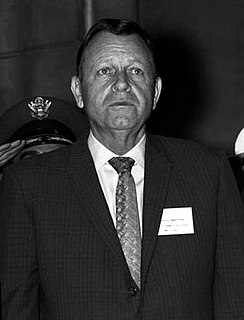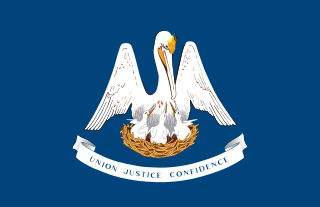
Earl Kemp Long was an American politician and the 45th Governor of Louisiana, serving three nonconsecutive terms. Long, known as "Uncle Earl", connected with voters through his folksy demeanor and colorful oratory. He departed from other southern politicians of his time by promoting a progressive agenda, including expanding school-lunch programs, teacher pay, public-works projects, and minority voting rights.

deLesseps Story Morrison, Sr., known as Chep Morrison, was an American attorney and politician, who was the 54th mayor of New Orleans, Louisiana from 1946 to 1961. He then served as an appointee of U.S. President John F. Kennedy as the United States ambassador to the Organization of American States between 1961 and 1963.
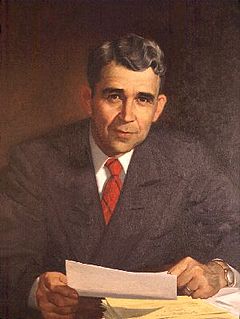
Robert Floyd Kennon Sr., known as Bob Kennon, was the 48th Governor of Louisiana, serving from 1952 to 1956. From 1954 to 1955, he was chairman of the National Governors Association. In 1955, he was also the chairman of the Council of State Governments.

Sam Houston Jones was the 46th Governor of Louisiana for the term from 1940 to 1944. He defeated the renowned Earl Kemp Long in the 1940 Democratic runoff primary election. Eight years later, Long then in a reversal of 1940 defeated Jones in the 1948 party primary.
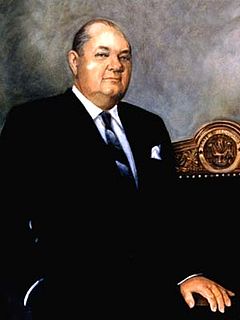
James Albert Noe Sr. of Monroe served for three and a half months as the 43rd Governor of Louisiana after the death of Oscar K. Allen on January 28, 1936.

The Louisiana gubernatorial election of 1944 was held in two rounds on January 18 and February 29, 1944. Like most Southern states between the Reconstruction Era and the Civil Rights Movement, Louisiana's Republican Party was virtually nonexistent in terms of electoral support. This meant that the two Democratic Party primaries held on these dates were the real contest over who would be governor. The 1944 election saw the reformer ‘anti-Long’ faction retain power for another four years under Jimmie Davis.

William Monroe Rainach Sr., known as Willie Rainach, was a state legislator from rural Summerfield in Claiborne Parish who led Louisiana's "Massive Resistance" to desegregation during the last half of the 1950s. He served Claiborne and neighboring Bienville Parish in north Louisiana for three terms in the Louisiana State Senate from 1948 to 1960.
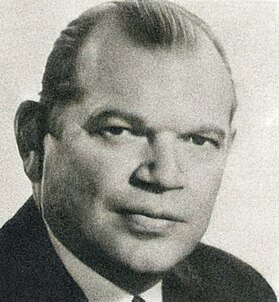
William Joseph "Bill" Dodd held five important positions in Louisiana government in the mid-20th century, including the offices of state representative, lieutenant governor, state auditor, president and member of the State Board of Education, and state education superintendent, but he never achieved his ultimate goal: the state's powerful Napoleonic-style governorship. Twice Dodd failed to win the pivotal Democratic gubernatorial nomination: 1952 and 1959. To his critics, he was a Long "hatchet man". To his admirers, he never let his defeats sour his optimistic spirit, his patriotism, or his devotion to his adopted home state.

The Louisiana gubernatorial election of 1956 was held on January 17, 1956. The 1956 election saw the election of Earl K. Long to his second full term as Governor of Louisiana. He received over 50% of the vote, defeating his opponents so soundly that no runoff vote was needed.

The Louisiana gubernatorial election of 1963–64 was held in three rounds. The two Democratic Party primaries were held on December 7, 1963 and January 11, 1964. The general election was held on March 3, 1964. The 1964 election saw the election of John McKeithen as governor.
Lucille May Grace, a.k.a. Mrs. Fred Columbus Dent Sr.,, was the first woman to attain statewide elected office in Louisiana. A Democrat, "Miss Grace," as she preferred to be called, became Register of the State Land Office in 1931 on appointment of Governor Huey Pierce Long Jr. She succeeded her father, who died in office, for whom she had previously worked. She was elected register in her own right in 1932, 1936, 1940, 1944, 1948, and 1956.

The New Orleans mayoral election of 1950 was held on January 24, 1950. It resulted in the re-election of deLesseps Morrison to his second term as Mayor of New Orleans.

The Louisiana gubernatorial election of 1991 resulted in the election of Edwin Edwards to his fourth non-consecutive term as governor of Louisiana. The election received national and international attention due to the unexpectedly strong showing of David Duke, a former Grand Wizard of the Knights of the Ku Klux Klan, who had ties to other white supremacist and neo-Nazi groups.

The Louisiana gubernatorial election of 1940 was held in two rounds on January 16 and February 20, 1940. Like most Southern states between the Reconstruction Era and the Civil Rights Movement, Louisiana's Republican Party was virtually nonexistent in terms of electoral support. This meant that the two Democratic Party primaries held on these dates were the real contest over who would be governor. The election resulted in the defeat of Earl K. Long and the election of Sam H. Jones as governor of Louisiana on a reform platform.

John Sidney Garrett was a conservative Democratic member of the Louisiana House of Representatives who served from 1948 to 1972 under four gubernatorial administrations. Garrett was a successful businessman in the small town of Haynesville in Claiborne Parish south of the Arkansas state line. In his last term, he was defeated for reelection even though he was the Speaker of the House. In 1966, Garrett made a strong but losing primary race for the Louisiana Public Service Commission to fill the seat vacated by the election of John McKeithen as governor. At the time, there were only three PSC districts; the number was increased to five under the Louisiana Constitution of 1974.
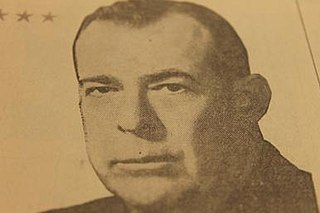
Clarence C. "Taddy" Aycock, a conservative Democrat from Franklin in St. Mary Parish, was the only three-term lieutenant governor in 20th century Louisiana history. He served from 1960 to 1972. Aycock failed in his only bid for governor in the 1971 Democratic primary. Few lieutenant governors in Louisiana have been elected directly to the governorship; former Governor Kathleen Babineaux Blanco of Lafayette, is a prominent exception.

The Louisiana gubernatorial election of 1948 was held in two rounds on January 20 and February 24, 1948. Like most Southern states between the Reconstruction Era and the Civil Rights Movement, Louisiana's Republican Party was virtually nonexistent in terms of electoral support. This meant that the two Democratic Party primaries held on these dates were the real contest over who would be governor. The 1948 election saw the defeat of Louisiana's reformer "anti-Long" faction and the election of Earl Kemp Long to his first full term as governor.

Ellen Bryan Moore was a pioneer of women in Louisiana politics, having served in the formerly elected office of "Register of State Lands" from 1952–1956 and 1960-1976. She served during World War II as a captain in the Women's Army Corps.

